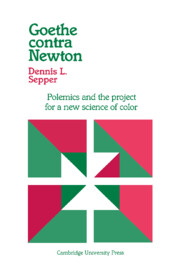Book contents
- Frontmatter
- Contents
- Preface
- List of abbreviations
- 1 Defining the questions of the Farbenlehre
- 2 The Farbenlehre in its origin
- 3 The problematics of Newton's theory of white light and colors
- 4 Factuality, certainty, and the organization of science
- 5 Goethe and the ethos of science
- Appendix
- Notes
- References
- Index
1 - Defining the questions of the Farbenlehre
Published online by Cambridge University Press: 21 November 2009
- Frontmatter
- Contents
- Preface
- List of abbreviations
- 1 Defining the questions of the Farbenlehre
- 2 The Farbenlehre in its origin
- 3 The problematics of Newton's theory of white light and colors
- 4 Factuality, certainty, and the organization of science
- 5 Goethe and the ethos of science
- Appendix
- Notes
- References
- Index
Summary
Should I not be proud, when for twenty years I have had to admit to myself that the great Newton and all the mathematicians and noble calculators along with him were involved in a decisive error with respect to the doctrine of color, and that I among millions was the only one who knew what was right in this great subject of nature? With this feeling of superiority, then, it was possible for me to endure the stupid presumption of my opponents. They sought in every way to persecute me and my doctrine and to make my ideas ridiculous; but I nonetheless took great pleasure in my completed work. All the attacks of my opponents only served to help me see human beings in their weakness.
– Goethe (Eck., 30 December 1823)The critical dilemma
The name Johann Wolfgang von Goethe (1749–1832) evokes the image of a giant of world literature. Although the epoch of adulation is past, and although his association with the bourgeois and petty aristocratic cultures of late eighteenth- and early nineteenth-century Germany has impaired his reputation, his greatness as a writer and his central role in the history of German literature are indisputable. Already in his youth he took the world of German letters by storm with his lyric poems, his drama Götz von Berlichingen, and his novel Die Leiden des jungen Werther – achievements that would have assured him an important chapter in literary histories.
Information
- Type
- Chapter
- Information
- Goethe contra NewtonPolemics and the Project for a New Science of Color, pp. 1 - 21Publisher: Cambridge University PressPrint publication year: 1988
